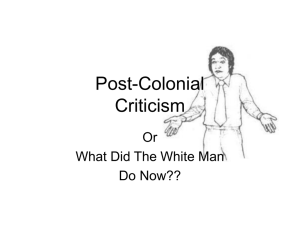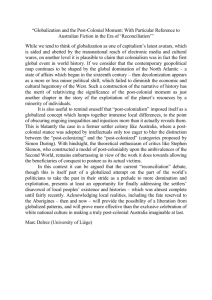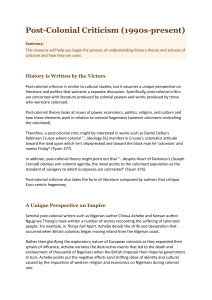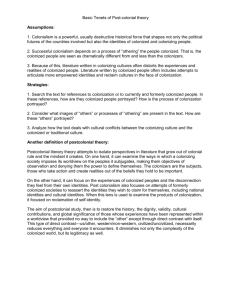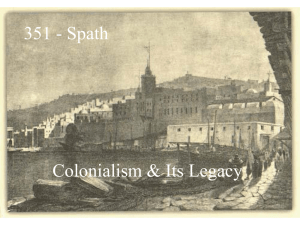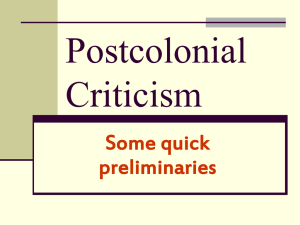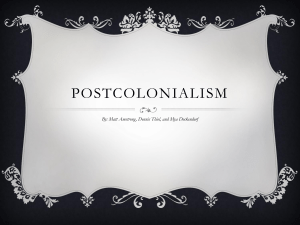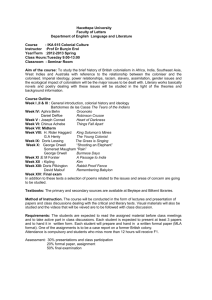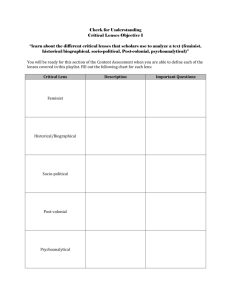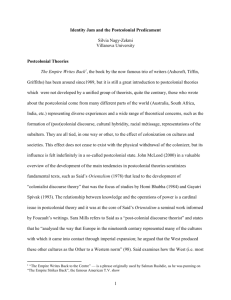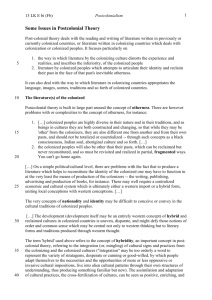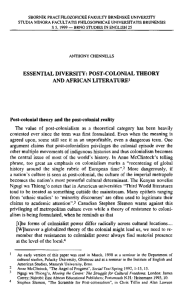Post-Colonialism: Literary Criticism – From “Post
advertisement
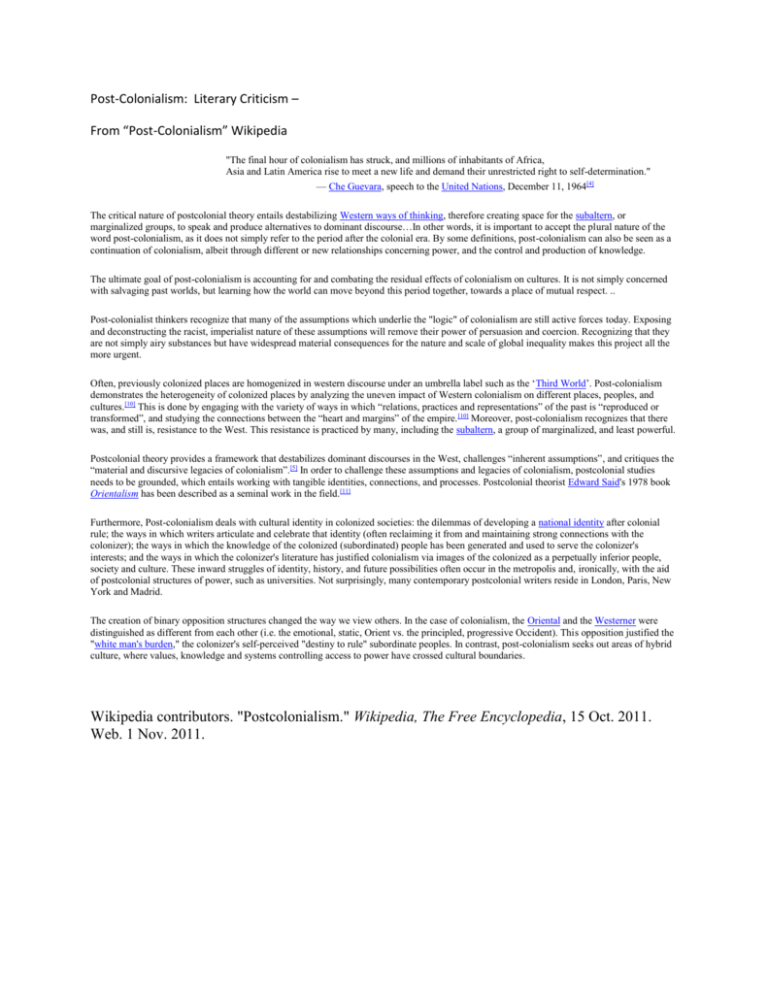
Post-Colonialism: Literary Criticism – From “Post-Colonialism” Wikipedia "The final hour of colonialism has struck, and millions of inhabitants of Africa, Asia and Latin America rise to meet a new life and demand their unrestricted right to self-determination." — Che Guevara, speech to the United Nations, December 11, 1964[4] The critical nature of postcolonial theory entails destabilizing Western ways of thinking, therefore creating space for the subaltern, or marginalized groups, to speak and produce alternatives to dominant discourse…In other words, it is important to accept the plural nature of the word post-colonialism, as it does not simply refer to the period after the colonial era. By some definitions, post-colonialism can also be seen as a continuation of colonialism, albeit through different or new relationships concerning power, and the control and production of knowledge. The ultimate goal of post-colonialism is accounting for and combating the residual effects of colonialism on cultures. It is not simply concerned with salvaging past worlds, but learning how the world can move beyond this period together, towards a place of mutual respect. .. Post-colonialist thinkers recognize that many of the assumptions which underlie the "logic" of colonialism are still active forces today. Exposing and deconstructing the racist, imperialist nature of these assumptions will remove their power of persuasion and coercion. Recognizing that they are not simply airy substances but have widespread material consequences for the nature and scale of global inequality makes this project all the more urgent. Often, previously colonized places are homogenized in western discourse under an umbrella label such as the ‘Third World’. Post-colonialism demonstrates the heterogeneity of colonized places by analyzing the uneven impact of Western colonialism on different places, peoples, and cultures.[10] This is done by engaging with the variety of ways in which “relations, practices and representations” of the past is “reproduced or transformed”, and studying the connections between the “heart and margins” of the empire. [10] Moreover, post-colonialism recognizes that there was, and still is, resistance to the West. This resistance is practiced by many, including the subaltern, a group of marginalized, and least powerful. Postcolonial theory provides a framework that destabilizes dominant discourses in the West, challenges “inherent assumptions”, and critiques the “material and discursive legacies of colonialism”.[5] In order to challenge these assumptions and legacies of colonialism, postcolonial studies needs to be grounded, which entails working with tangible identities, connections, and processes. Postcolonial theorist Edward Said's 1978 book Orientalism has been described as a seminal work in the field.[11] Furthermore, Post-colonialism deals with cultural identity in colonized societies: the dilemmas of developing a national identity after colonial rule; the ways in which writers articulate and celebrate that identity (often reclaiming it from and maintaining strong connections with the colonizer); the ways in which the knowledge of the colonized (subordinated) people has been generated and used to serve the colonizer's interests; and the ways in which the colonizer's literature has justified colonialism via images of the colonized as a perpetually inferior people, society and culture. These inward struggles of identity, history, and future possibilities often occur in the metropolis and, ironically, with the aid of postcolonial structures of power, such as universities. Not surprisingly, many contemporary postcolonial writers reside in London, Paris, New York and Madrid. The creation of binary opposition structures changed the way we view others. In the case of colonialism, the Oriental and the Westerner were distinguished as different from each other (i.e. the emotional, static, Orient vs. the principled, progressive Occident). This opposition justified the "white man's burden," the colonizer's self-perceived "destiny to rule" subordinate peoples. In contrast, post-colonialism seeks out areas of hybrid culture, where values, knowledge and systems controlling access to power have crossed cultural boundaries. Wikipedia contributors. "Postcolonialism." Wikipedia, The Free Encyclopedia, 15 Oct. 2011. Web. 1 Nov. 2011. Post-Colonial Criticism (1990s-present) Summary: This resource will help you begin the process of understanding literary theory and schools of criticism and how they are used in the academy. Contributors:Allen Brizee, J. Case Tompkins Last Edited: 2010-04-21 08:25:45 History is Written by the Victors Post-colonial criticism is similar to cultural studies, but it assumes a unique perspective on literature and politics that warrants a separate discussion. Specifically, post-colonial critics are concerned with literature produced by colonial powers and works produced by those who were/are colonized. Post-colonial theory looks at issues of power, economics, politics, religion, and culture and how these elements work in relation to colonial hegemony (western colonizers controlling the colonized). Therefore, a post-colonial critic might be interested in works such as Daniel Defoe's Robinson Crusoe where colonial "...ideology [is] manifest in Crusoe's colonialist attitude toward the land upon which he's shipwrecked and toward the black man he 'colonizes' and names Friday" (Tyson 377). In addition, post-colonial theory might point out that "...despite Heart of Darkness's (Joseph Conrad) obvious anti-colonist agenda, the novel points to the colonized population as the standard of savagery to which Europeans are contrasted" (Tyson 375). Post-colonial criticism also takes the form of literature composed by authors that critique Euro-centric hegemony. A Unique Perspective on Empire Seminal post-colonial writers such as Nigerian author Chinua Achebe and Kenyan author Ngugi wa Thiong'o have written a number of stories recounting the suffering of colonized people. For example, in Things Fall Apart, Achebe details the strife and devastation that occurred when British colonists began moving inland from the Nigerian coast. Rather than glorifying the exploratory nature of European colonists as they expanded their sphere of influence, Achebe narrates the destructive events that led to the death and enslavement of thousands of Nigerians when the British imposed their Imperial government. In turn, Achebe points out the negative effects (and shifting ideas of identity and culture) caused by the imposition of western religion and economics on Nigerians during colonial rule. Power, Hegemony, and Literature Post-colonial criticism also questions the role of the western literary canon and western history as dominant forms of knowledge making. The terms "first-world," "second world," "third world" and "fourth world" nations are critiqued by post-colonial critics because they reinforce the dominant positions of western cultures populating first world status. This critique includes the literary canon and histories written from the perspective of first-world cultures. So, for example, a post-colonial critic might question the works included in "the canon" because the canon does not contain works by authors outside western culture. Moreover, the authors included in the canon often reinforce colonial hegemonic ideology, such as Joseph Conrad's Heart of Darkness. Western critics might consider Heart of Darkness an effective critique of colonial behavior. But post-colonial theorists and authors might disagree with this perspective: "...as Chinua Achebe observes, the novel's condemnation of European is based on a definition of Africans as savages: beneath their veneer of civilization, the Europeans are, the novel tells us, as barbaric as the Africans. And indeed, Achebe notes, the novel portrays Africans as a pre-historic mass of frenzied, howling, incomprehensible barbarians..." (Tyson 374-375). Typical questions: How does the literary text, explicitly or allegorically, represent various aspects of colonial oppression? What does the text reveal about the problematics of post-colonial identity, including the relationship between personal and cultural identity and such issues as double consciousness and hybridity? What person(s) or groups does the work identify as "other" or stranger? How are such persons/groups described and treated? What does the text reveal about the politics and/or psychology of anti-colonialist resistance? What does the text reveal about the operations of cultural difference - the ways in which race, religion, class, gender, sexual orientation, cultural beliefs, and customs combine to form individual identity - in shaping our perceptions of ourselves, others, and the world in which we live? How does the text respond to or comment upon the characters, themes, or assumptions of a canonized (colonialist) work? Are there meaningful similarities among the literatures of different post-colonial populations? How does a literary text in the Western canon reinforce or undermine colonialist ideology through its representation of colonialization and/or its inappropriate silence about colonized peoples? (Tyson 378-379) Here is a list of scholars we encourage you to explore to further your understanding of this theory: Criticism Edward Said - Orientalism, 1978; Culture and Imperialism, 1994 Kamau Braithwaite - The History of the Voice, 1979 Gayatri Spivak - In Other Worlds: Essays in Cultural Politics, 1987 Dominick LaCapra - The Bounds of Race: Perspectives on Hegemony and Resistance, 1991 Homi Bhabha - The Location of Culture, 1994 Literature and non-fiction… see the OWL website. Brizee, Allen, and J. Case Thompkins. "Purdue OWL: Literary Theory and Schools of Criticism." Welcome to the Purdue University Online Writing Lab (OWL). Purdue University, 21 June 2010. Web. 01 Nov. 2011.
